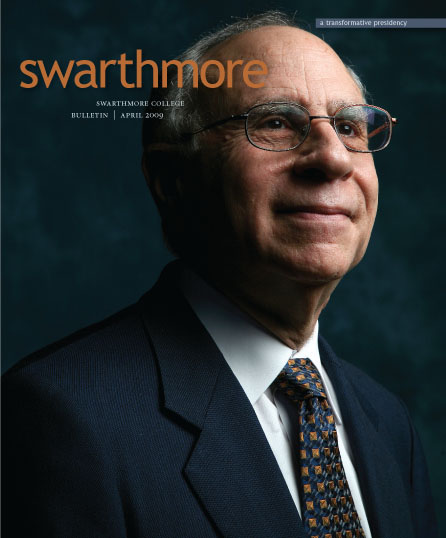Board Postpones Key Budget Decisions
At its February meeting, Swarthmore’s Board of Managers usually approves the College’s budget for the upcoming fiscal year that begins on July 1. But this year, the Board decided to consider the 2009–2010 budget in phases.
On Feb. 21, the Board made decisions on student charges, enrollment, financial aid, and capital projects. It deferred decisions on the remainder of the budget, including compensation and departmental budgets, until its May meeting.
According to Vice President for Finance and Treasurer Suzanne Welsh, the Managers wanted to have “as much information as possible about the economy and its impact on the endowment, students’ and families’ financial situations, and our donors’ ability to give” before finalizing next year’s budget.
Student charges for the academic year 2009–2010 will rise 3.76 percent—the lowest increase in 10 years. Total charges for tuition, student activities, room, and board will be $49,600. The Board reaffirmed its 2007 decision to give “loan-free” financial aid awards to all aided students. Suggested summer earnings and term-time work components of financial aid awards will remain the same as the current fiscal year.
The target for on-campus enrollment will be 1,406 students, an increase of 16. The target for the entering Class of 2013 will be 390 students. The College also expects to accept 27 transfer students in the upper classes, mostly sophomores.
The Board approved a significant reduction in capital spending for facilities projects over the next three years. In 2009–2010, facilities projects are expected to be $3.3 million, more than a $5 million reduction from the current fiscal year.
“Because the endowment continues to pay for the largest portion of the budget,” Welsh said, “the decline in the value of the endowment necessitates a decline in the dollars available to support the budget. Even with reductions in the budget and capital spending, the endowment spending rate will increase to a level of slightly under 6 percent—the highest spending rate in the College’s history. Because of our conservative endowment spending policy, the Board is willing to have a higher spending rate for the short term while we see how this economic crisis unfolds and develop carefully thought-out plans to respond.”
In May, the Board will approve salaries and noncompensation department budgets, which together account for more than 80 percent of the College’s budget. “Salary freezes for faculty and staff are under strong consideration,” Welsh said. “We will also seek savings in noncompensation budgets wherever possible.”
—Jeffrey Lott
 Email This Page
Email This Page